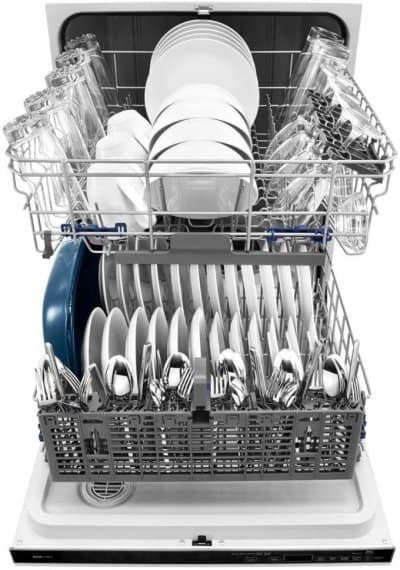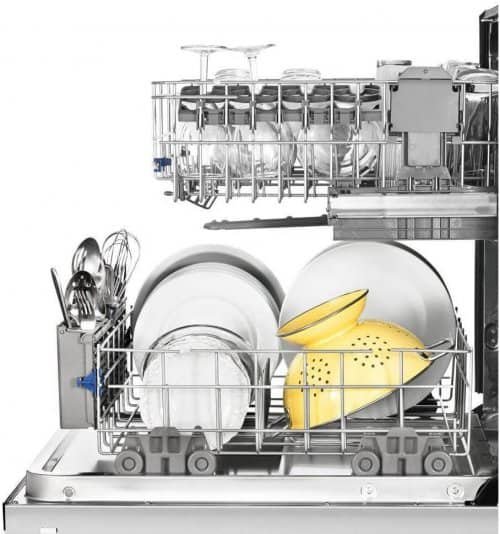Dishwashers have become an essential part of modern kitchens, offering convenience and efficiency. One of the common questions that arise is how much water a dishwasher uses in a cycle. Understanding this can help you make informed decisions about your water consumption and environmental impact. In this article, we’ll delve into the details of dishwasher water usage, provide tips for efficient operation, and address common queries.
Table of Contents
How Much Water Does a Dishwasher?
Dishwasher water consumption can vary based on factors such as the dishwasher model, cycle selected, and load size. On average, a standard dishwasher uses around 6 to 10 gallons (22.7 to 37.9 liters) of water per cycle. However, modern dishwashers are designed with advanced technology that aims to minimize water usage while still ensuring effective cleaning.
How Much Water Does a 1 hour Dishwasher Cycle use?
The amount of water used in a 1-hour dishwasher cycle can vary depending on the age and model of the dishwasher. Modern dishwashers are designed to be more water-efficient and typically use around 1.64 to 3.5 gallons of water per cycle. This is significantly less compared to hand washing, which can use anywhere from 9 to 27 gallons of water.

It’s important to note that older dishwashers may use much more water, with some models consuming over 16 gallons per cycle. Therefore, if you have an older dishwasher, it might be worth considering upgrading to a newer, more efficient model to save both water and energy.
Overall, modern dishwashers are a great option for conserving water while still effectively cleaning your dishes. By using less water than hand washing and older dishwasher models, they help reduce our overall water consumption and contribute to environmental sustainability.
Factors Affecting Water Consumption
Several factors influence how much water a dishwasher uses in a cycle:
- Cycle Type: Different cycles, such as light, normal, heavy, and eco-friendly, can impact water usage. Eco-friendly cycles typically use less water as they focus on energy and water conservation.
- Load Size: Fully loaded dishwashers are generally more water-efficient than those with partial loads. Running the dishwasher only when it’s full can help optimize water usage.
- Dishwasher Age and Model: Newer models often come with water-saving features like sensors that adjust water levels based on the load’s dirtiness. These features contribute to lower water consumption.
- Pre-Rinsing: If dishes are heavily pre-rinsed before loading, the dishwasher might use less water during the cycle.

Tips for Water-Efficient Dishwasher Usage
- Scrape, Don’t Rinse: Instead of rinsing dishes under running water, scrape off excess food scraps before loading them into the dishwasher.
- Load Efficiently: Load dishes in a way that maximizes space without overcrowding. This ensures an effective cleaning process without the need for additional cycles.
- Use Eco-Friendly Cycles: Whenever possible, opt for eco-friendly or energy-saving cycles. These cycles are designed to be more water-efficient.
- Full Loads Only: Wait until you have a full load before running the dishwasher. This not only optimizes water usage but also conserves energy.
- Check the Manual: Refer to your dishwasher’s manual to understand water-saving features and recommended loading techniques for maximum efficiency.
FAQs about Dishwasher Water Consumption
Can I use the dishwasher for smaller loads to save water?
Yes, while using a smaller load can save water, it’s even more efficient to wait until the dishwasher is full to maximize water and energy usage.
Is hand washing more water-efficient than using a dishwasher?
When done efficiently, using a dishwasher is generally more water-efficient than hand washing, especially for larger loads.
How do modern dishwashers use less water?
Modern dishwashers utilize sensors to determine load size and dirtiness, adjusting water levels accordingly. They also offer eco-friendly cycles designed for water conservation.
Can I use any type of detergent in my dishwasher?
It’s recommended to use detergents specifically designed for dishwashers. Using the wrong type can lead to excessive suds and poor cleaning performance.
Are there any regulations on dishwasher water usage?
Some regions have regulations or guidelines for water efficiency in appliances, including dishwashers. Check your local regulations for more information.
Does using the dishwasher save more water than hand washing if I pre-rinse dishes?
Pre-rinsing dishes can negate some of the water-saving benefits of using a dishwasher. It’s best to scrape off excess food and load the dishwasher efficiently.

Conclusion
Understanding how much water a dishwasher uses in a cycle is crucial for making environmentally conscious choices in the kitchen. While dishwashers are designed to be water-efficient, adopting smart practices such as using full loads, eco-friendly cycles, and proper loading techniques can further reduce water consumption. By following these tips and making informed decisions, you can enjoy clean dishes while contributing to water conservation efforts.

